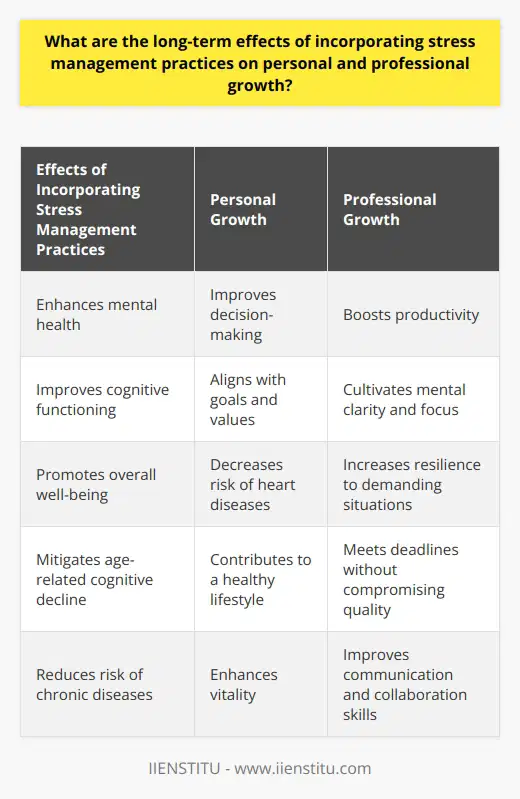
Introduction to Systemic Conversation Management
The Benefits of Stress Management Through Systemic Conversation Management
Strategies for Effective Stress Management Through Systemic Conversation Management
Challenges Faced in Implementing Systemic Conversation Management for Stress Management
Conclusion: The Impact of Systemic Conversation Management on Stress Management
Related Course: Stress Management Online Course Free
Introduction to Systemic Conversation Management
Stress is a normal part of life, and it can significantly impact our mental and physical well-being. Fortunately, there are various strategies we can use to manage stress. One such strategy is systemic conversation management, which is a process that aims to address individual, relational, and systemic issues through dialogue and exploration. This form of stress management involves actively engaging with one’s environment and exploring the underlying causes of stress.
The Benefits of Stress Management Through Systemic Conversation Management
Systemic conversation management can provide numerous benefits for those looking to manage their stress. Firstly, it can help identify the root cause of stress, which can be addressed through dialogue. Through systemic conversation, individuals can better understand their priorities and how to manage them. Furthermore, this form of stress management can help build resilience, as it encourages individuals to explore their emotions and experiences safely and meaningfully.
Additionally, systemic conversation management can foster better communication within relationships. Individuals can develop empathy and understanding by understanding each other’s thoughts, feelings, and experiences. This can be especially beneficial for couples or families, as it can help strengthen their bond and reduce stress.
Strategies for Effective Stress Management Through Systemic Conversation Management
When using systemic conversation management to manage stress, it is essential to have an effective strategy in place. Firstly, it is crucial to create a safe and supportive environment. This will allow individuals to feel comfortable sharing their thoughts and feelings without fear of judgment. It is also essential to be mindful of the language used and to avoid using words or phrases that could be triggering.
Furthermore, it is essential to focus on the present. Systemic conversation management is about exploring the present moment and addressing any underlying issues contributing to stress. It is not about revisiting the past or discussing potential future events. Finally, it is essential to ensure that everyone involved is heard. This will allow everyone to feel respected and valued, which can help to reduce stress.
Challenges Faced in Implementing Systemic Conversation Management for Stress Management
Although systemic conversation management can be an effective strategy for managing stress, specific challenges may need to be addressed. Firstly, it cannot be easy to create a safe and supportive environment for everyone involved. Individuals may be reluctant to share their thoughts and feelings or may be unwilling to accept the ideas of others. Furthermore, this form of stress management requires a significant amount of time and effort. It takes time to fix and needs individuals to be willing to invest the necessary time and energy into the process.
Conclusion: The Impact of Systemic Conversation Management on Stress Management
Systemic conversation management is an effective strategy for managing stress. It can help individuals identify their anxiety's root cause, build resilience, and foster better communication within relationships. However, it is essential to have an effective strategy and be mindful of potential challenges. With the right approach, systemic conversation management can positively impact stress management.
The way we communicate shapes our stress levels. Systemic conversations can help us manage it.
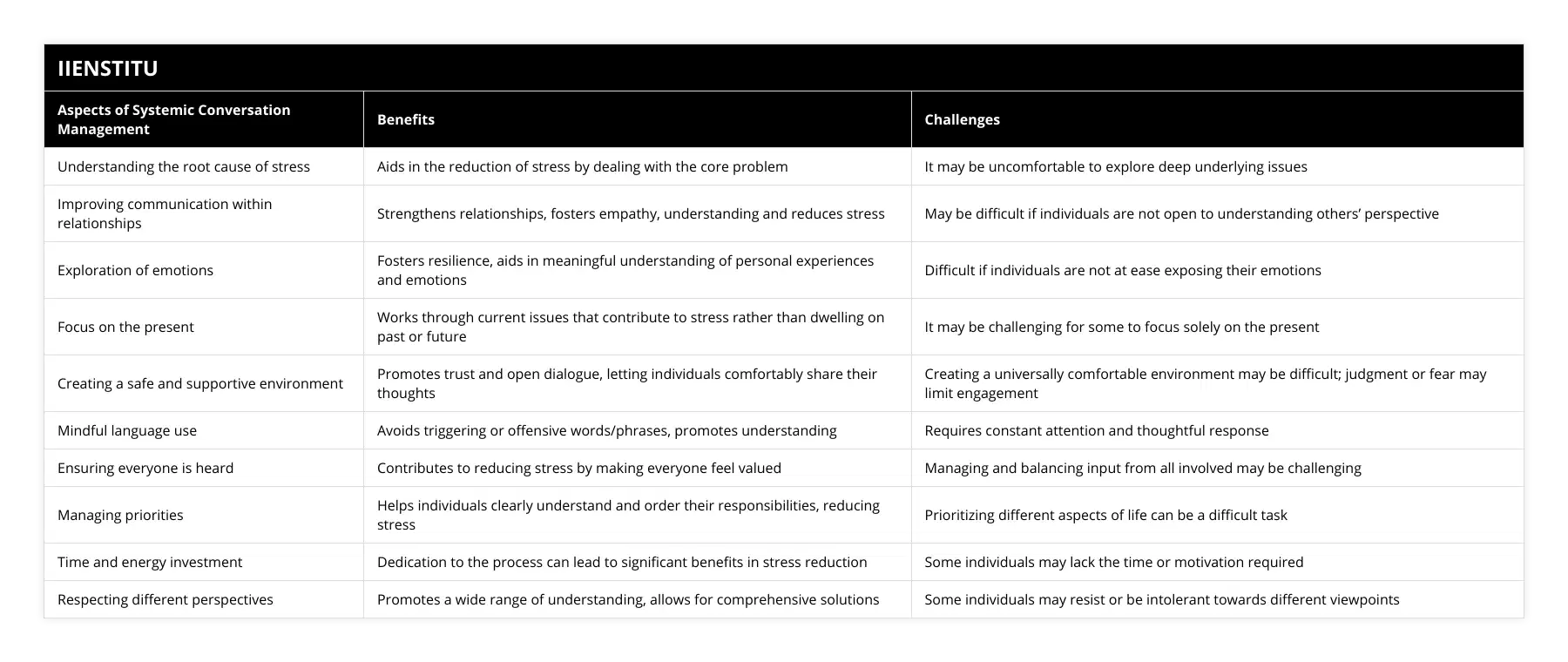
Frequently Asked Questions
What are the benefits of stress management through systemic conversation?
Stress is a common phenomenon in today's world, one that can have a profound impact on our well-being. Systemic conversation is an effective way of managing stress and can benefit those who practice it.
The systemic conversation is based on the idea that stress is often rooted in underlying family dynamics or systemic behavior patterns. By engaging in discussions with those around us, we can become more aware of these dynamics and how they affect us. As we gain a better understanding of these patterns, we can change how we interact with our environment, reducing stress levels.
One benefit of systemic conversation is improved communication skills. By engaging in discussions about our experiences and emotions, we can become more empathetic toward others and better equipped to handle difficult discussions efficiently. This improved communication ability can also reduce interpersonal conflicts and help us build stronger relationships with those around us.
The systemic conversation also helps us develop better self-awareness, as reflecting on our thoughts and feelings allows us to gain insight into ourselves and our relationships with others. This increased understanding of ourselves can lead to greater self-confidence, which in turn helps reduce stress levels even further. In addition, by observing our behavior within family dynamics, we can identify unhelpful patterns that contribute to stress and take steps toward changing them for the better.
Finally, the systemic conversation provides an opportunity for meaningful connection between individuals within families or other groups of people who may not have had much contact before. This connection can foster strong bonds between family members or friends, which is beneficial when managing stress collectively rather than individually.
In conclusion, the systemic conversation provides numerous benefits when managing stress levels, including improved communication skills, increased self-awareness, and enhanced connections between family members or other groups. For these reasons, it is an effective tool for reducing overall levels of stress and improving well-being over time
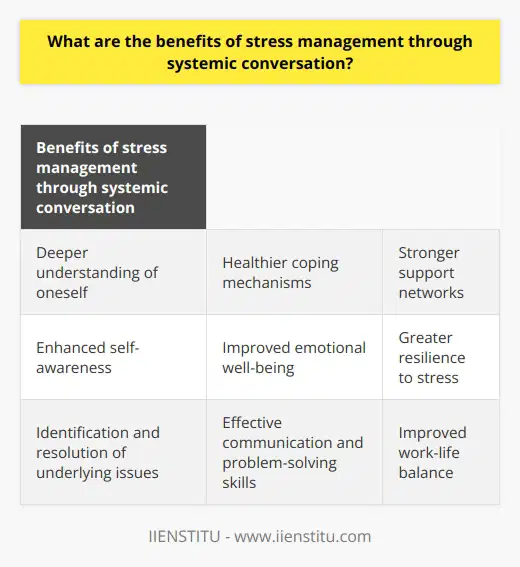
How can systemic conversation management be used to foster better communication within relationships?
Systemic conversation management has become an increasingly popular way to create better relationship communication. This type of management focuses on understanding the different elements of a conversation and using them to foster more effective communication.
At its core, systemic conversation management helps individuals understand a conversation's underlying dynamics. This includes exploring how each person contributes to the discussion and how the conversation can be structured to encourage effective communication. It also helps to identify potential communication barriers that can prevent effective dialogue and how to address them.
Systemic conversation management can also build trust and understanding between two people. By exploring the dynamics of the conversation, individuals can better understand each other and create a shared experience of their relationship. This can lead to more meaningful discussions where both parties feel heard and respected.
Systemic conversation management can also be used to identify and address conflicts. This includes understanding the root cause of the competition and how each person in the conversation contributes to it. By understanding the dynamics of a match, individuals can work together to create a productive resolution.
Finally, systemic conversation management can be used to create a safe space for dialogue. By creating a safe distance, individuals can feel more comfortable expressing their feelings, opinions, and beliefs without fear of judgment or criticism. This can create an environment of mutual respect and understand essential for building solid relationships.
Systemic conversation management can be a powerful tool for fostering better communication. By understanding the dynamics of a conversation, creating a safe space for dialogue, and addressing potential conflicts, individuals can create a more effective and meaningful dialogue with each other.
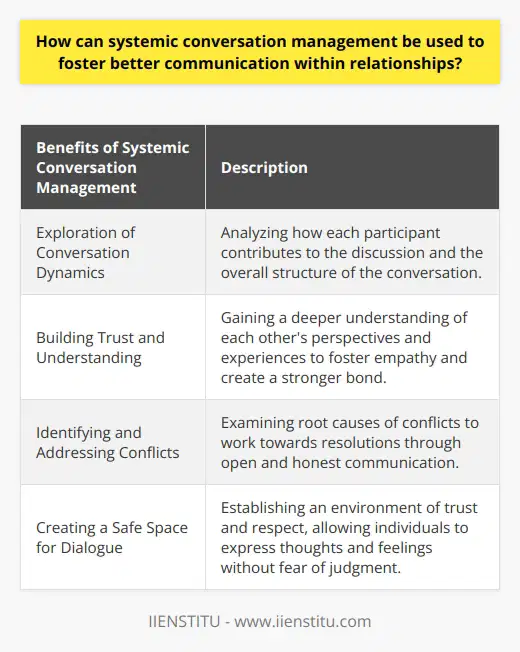
What strategies should be employed when using systemic conversation management to manage stress?
When engaging in systemic conversation management to manage stress, several strategies can be employed to achieve the desired results. First and foremost, creating a space of trust and respect is essential. This can be accomplished by actively listening to the other person without judgment or criticism. It is also necessary to validate the other person's feelings and experiences while remaining focused on the present moment.
Second, it is essential to remain non-confrontational when managing a stressful conversation. This means avoiding aggressive behaviors such as raising one's voice or making assumptions about another person's motivations. Instead, it is essential to understand where each party is coming from and help them develop a mutually beneficial solution.
Third, utilizing problem-solving techniques can help diffuse tension during a stressful conversation. It can be helpful to brainstorm solutions together while being mindful of each party's needs and wants. Additionally, open dialogue about potential solutions allows both parties to express their opinions without fear of judgment or criticism.
Finally, it is essential for both parties involved in a conversation about stress management to take ownership of their own emotions and reactions during the discussion. Reflecting on how each participant feels during the meeting helps create an environment where they feel safe expressing themselves without fear of judgment or criticism from the other party.
In conclusion, systemic conversation management has proven effective for managing stress in conversations between two or more individuals. By creating an environment of trust and respect through active listening, remaining non-confrontational, utilizing problem-solving techniques, and taking ownership of one's emotions during difficult conversations, individuals can effectively manage their stress levels while maintaining meaningful dialogue.
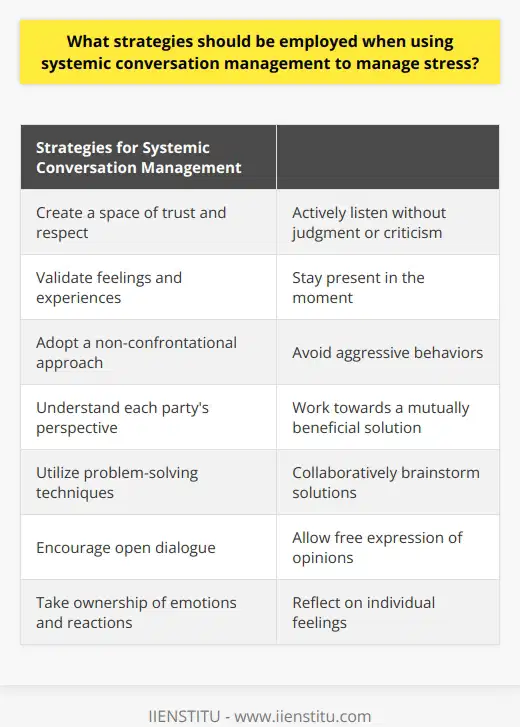
What are the benefits of stress management counselling?
Benefits of Stress Management Counselling
Enhanced Coping Skills
One of the primary benefits of stress management counselling is the development of enhanced coping skills. Through the guidance of a trained professional, individuals learn various tools and techniques to help them manage stress more effectively in their day-to-day lives, such as relaxation exercises, cognitive restructuring, and problem-solving strategies.
Improved Physical Health
Consistently managing stress positively affects physical health. Uncontrolled stress can lead to headaches, sleep disturbances, and weakened immune systems, making individuals more susceptible to illnesses. Stress management counselling helps individuals to address and mitigate these physical symptoms, potentially leading to improved overall well-being.
Boosted Self-Confidence
As individuals gain the skills to control and manage stress, they often also experience a boost in self-confidence. Developing resilience to stressors leads to a sense of empowerment, allowing them to feel more secure in their ability to handle challenging situations that arise both personally and professionally.
Increased Emotional Intelligence
Through stress management counselling, individuals can gain a deeper understanding of their own emotional reactions and those of others. Developing emotional intelligence allows people to navigate relationships and emotions more effectively, which subsequently benefits their emotional well-being and overall mental health.
Reduction in Anxiety and Depression
Unmanaged stress is often a precursor to anxiety and depression. By learning to manage stress effectively through counselling, individuals can reduce their susceptibility to these mental health conditions. As a result, they may experience improvements in mood, overall psychological well-being, and their ability to function in daily life.
Enhanced Relationships and Communication
Stress can negatively impact relationships as it often leads to resentment, irritability, and poor communication. By adopting healthier stress management strategies, individuals are able to communicate more effectively and maintain healthier relationships, thus improving the quality of their personal and professional interactions.
In conclusion, stress management counselling offers a myriad of benefits that contribute to enhanced mental, emotional, and physical well-being. Through this therapeutic approach, individuals learn crucial coping skills and gain deeper insight into their emotions, enabling them to feel more confident and competent in managing life's challenges.
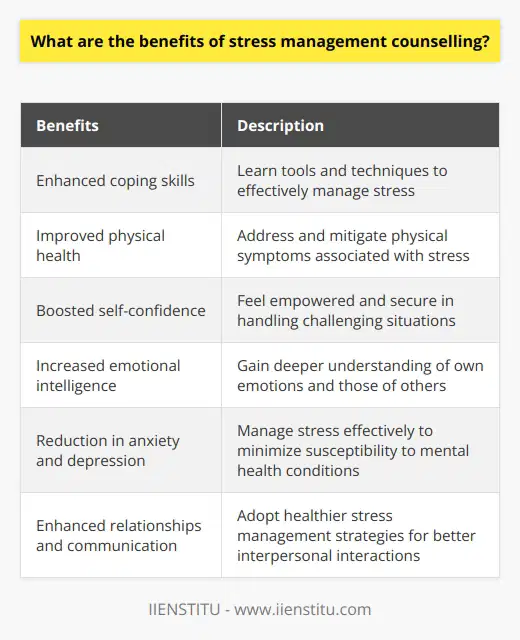
What are five stress management techniques?
Stress Management Techniques
Mindfulness Meditation
One effective stress management technique is mindfulness meditation, which involves focusing one's attention on the present moment and accepting it without judgment. This practice reduces stress by allowing individuals to develop a greater awareness of their emotions and thought patterns, making it easier to cope with stressors.
Exercise and Physical Activity
Engaging in regular exercise is another proven method for managing stress because physical activity increases the production of endorphins, the brain's feel-good neurotransmitters. Regular aerobic exercises such as brisk walking, jogging or swimming can lower stress levels and leave the individual feeling more relaxed and energized.
Proper Sleep and Nutrition
Ensuring adequate sleep and maintaining a healthy diet are essential components of stress management. Sufficient sleep and proper nutrition help replenish the body's energy reserves and maintain optimal functioning, both of which contribute to an individual's ability to cope with stressors.
Time Management and Organization
Effective time management and organization skills can play a significant role in reducing stress. Implementing practical strategies such as breaking larger tasks into smaller, manageable components, setting priorities, and delegating responsibilities can help individuals manage their workload, resulting in reduced stress levels.
Relaxation Techniques
Lastly, practicing relaxation techniques such as deep breathing exercises, progressive muscle relaxation, or guided imagery can help individuals regain a sense of calm and control during stressful situations. By consciously focusing on calming the body and mind, individuals can significantly reduce their stress levels and enhance their overall well-being.
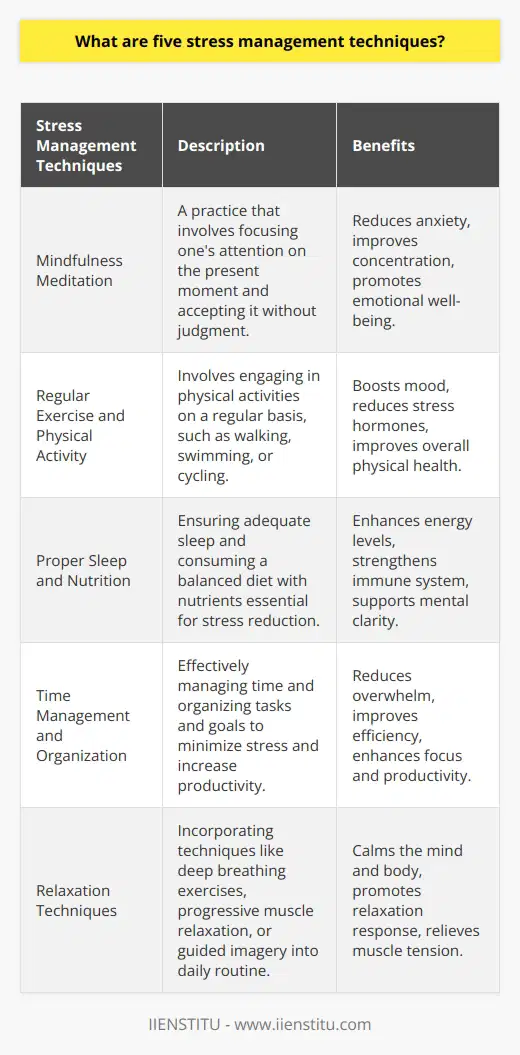
What are the benefits of stress management in the workplace?
Benefits of Stress Management
In the contemporary workplace, stress management serves as a vital component for maintaining employees' overall well-being and productivity. When organizations prioritize stress management, numerous benefits emanate, contributing positively both to individuals and the organization itself.
Enhanced Productivity
Employees experiencing reduced stress levels tend to be more focused and efficient in executing their responsibilities. By applying stress management techniques, such as sufficient breaks and adequate rest, employees become more energized and can perform at optimal levels, boosting organizational productivity.
Improved Employee Health
Stress management in the workplace significantly contributes to better physical and mental health among employees. Stress reduction measures, like mindfulness training or exercise programs, promote a healthier workforce and reduce absenteeism due to illnesses caused by stress.
Higher Retention Rates
Workplaces that actively manage stress provide environments that foster employee satisfaction and overall well-being. In turn, these environments encourage employees to remain with the organization, reducing turnover rates and retaining valuable experience and talent within the company.
Stronger Teamwork
Effective stress management fosters collaboration and supports positive relationships among employees. In cohesive work environments, employees tend to communicate better and work more harmoniously as a team, ultimately enhancing overall organizational success.
Greater Creativity and Innovation
When employees experience lower stress levels, their minds are less hindered by negative emotions, which permits enhanced mental clarity and creativity. Consequently, organizations that support stress management strategies cultivate environments that are more conducive to innovation and creative problem-solving.
In conclusion, by prioritizing stress management, organizations stand to reap various benefits that extend beyond just the individual employee's well-being. These benefits include enhanced productivity, improved employee health, higher retention rates, stronger teamwork, and greater creativity and innovation. Ultimately, effective stress management strategies contribute significantly to an organization's overall success and longevity.
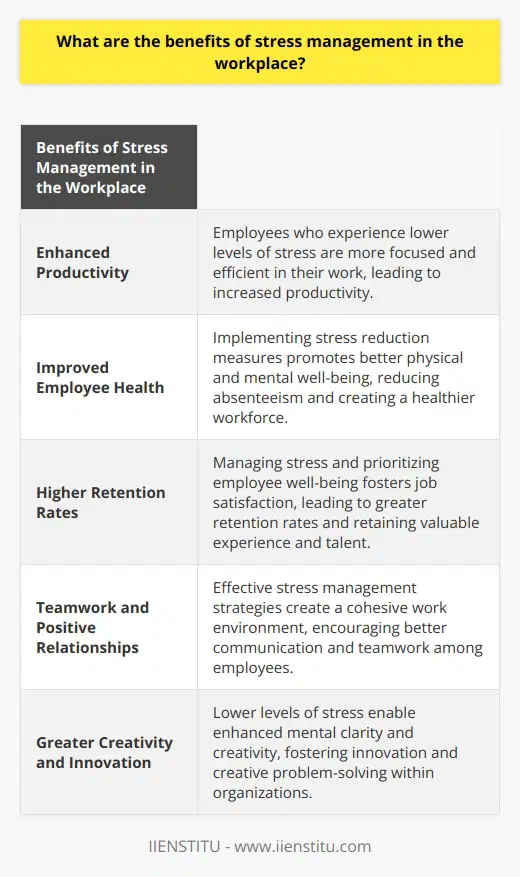
What are the key components of an effective stress management program?
Identifying Personal Stressors
An effective stress management program begins with identifying personal stressors, which can vary greatly among individuals. These may include workload, relationships, financial concerns, or health issues. Recognizing the factors that contribute to stress allows individuals to target their interventions more effectively.
Developing Coping Strategies
After identifying stressors, employing suitable coping strategies is crucial. These can include problem-solving techniques, time management skills, and seeking social support. For those struggling with sleep or anxiety, relaxation methods such as deep breathing exercises, progressive muscle relaxation, or meditation can be beneficial. Practicing these coping strategies regularly promotes adaptation to stressful situations and overall resilience.
Maintaining a Healthy Lifestyle
A balanced and healthy lifestyle plays a key role in managing stress. Prioritizing exercise, sleep, and a nutritious diet helps maintain both physical and mental well-being, making it easier to cope with stress. Additionally, incorporating hobbies and leisure activities into one's routine allows for a release of tension and restoration of mental energy.
Setting Realistic Expectations
An essential element of a stress management program is setting achievable goals and expectations for oneself. Unrealistic expectations or the strive for perfectionism can exacerbate stress levels. By setting attainable objectives, individuals can prevent feelings of failure and maintain a sense of control over their lives.
Practicing Mindfulness
Mindfulness, the act of paying attention to one's thoughts, feelings, and bodily sensations, can be a powerful tool in stress management. Mindfulness allows individuals to cultivate awareness and acceptance of their emotions, decreasing the negative impact of stress. Engaging in activities such as mindful meditation, yoga, or journaling helps develop mindfulness skills.
Seeking Professional Help
Lastly, seeking professional assistance from therapists, counselors, or mental health professionals can significantly support and refine an individual's stress management program. Professionals can provide tailored guidance on coping strategies, share evidence-based techniques, and monitor progress, ensuring a comprehensive and personalized approach to managing stress.
In conclusion, an effective stress management program consists of identifying personal stressors, developing coping strategies, maintaining a healthy lifestyle, setting realistic expectations, practicing mindfulness, and seeking professional help when necessary. Implementing these key components contributes to a holistic and adaptive approach to managing stress, promoting overall well-being and resilience.
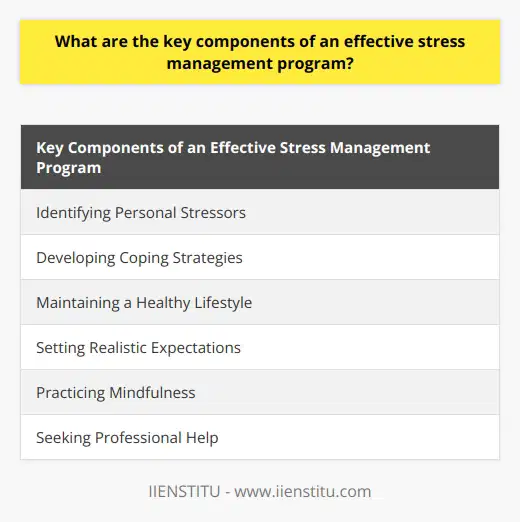
How does the integration of stress management techniques contribute to overall mental health and well-being?
Effective Stress Management Strategies
Integration of stress management techniques plays a crucial role in enhancing overall mental health and well-being. By engaging in various practices that help reduce and manage stress, individuals can achieve a healthier balance between their emotional, physical, and mental states.
Cultivating Resilience
One major contribution is the development of resilience, which is the ability to adapt to adversity and maintain equilibrium. As individuals learn to deal with stress through effective problem-solving, communication, and coping skills, they become more resilient in the face of future challenges. This strengthens their mental health, leading to increased self-esteem, confidence, and a more optimistic outlook on life.
Reduced Risk of Mental Disorders
Proper stress management techniques also contribute to the prevention of mental disorders commonly associated with chronic stress, such as depression, anxiety, and burnout. By managing stress levels and fostering healthier thought patterns, individuals can protect their mental well-being and mitigate the risks of developing such disorders.
Maintenance of Cognitive Function
Furthermore, stress management is essential for maintaining cognitive functions as well, such as memory, attention, and problem-solving. Chronic stress can negatively impact these cognitive functions over time. Thus, the ability to manage stress effectively can contribute to improved cognitive performance and a lower risk of cognitive decline.
Physical Health Benefits
Additionally, it is essential to consider the interdependency between mental and physical health. Inadequately managed stress can lead to a weakened immune system, high blood pressure, heart disease, and other physical health risks. Implementing stress management techniques can help individuals maintain a healthy mind-body connection, reducing the likelihood of such issues.
Promotion of Positive Habits
Lastly, engaging in stress management techniques often prompts individuals to adopt healthier habits, such as regular exercise, a balanced diet, and sufficient sleep. These positive habits not only contribute to improved mental health, but also provide a foundation for a healthier and happier lifestyle.
In conclusion, the integration of stress management techniques is a key contributor to overall mental health and well-being. By fostering resilience, reducing the risk of mental disorders, maintaining cognitive function, promoting physical health, and encouraging positive habits, individuals can effectively protect and enhance their mental well-being. These results, in turn, contribute to more fulfilling and balanced lives.
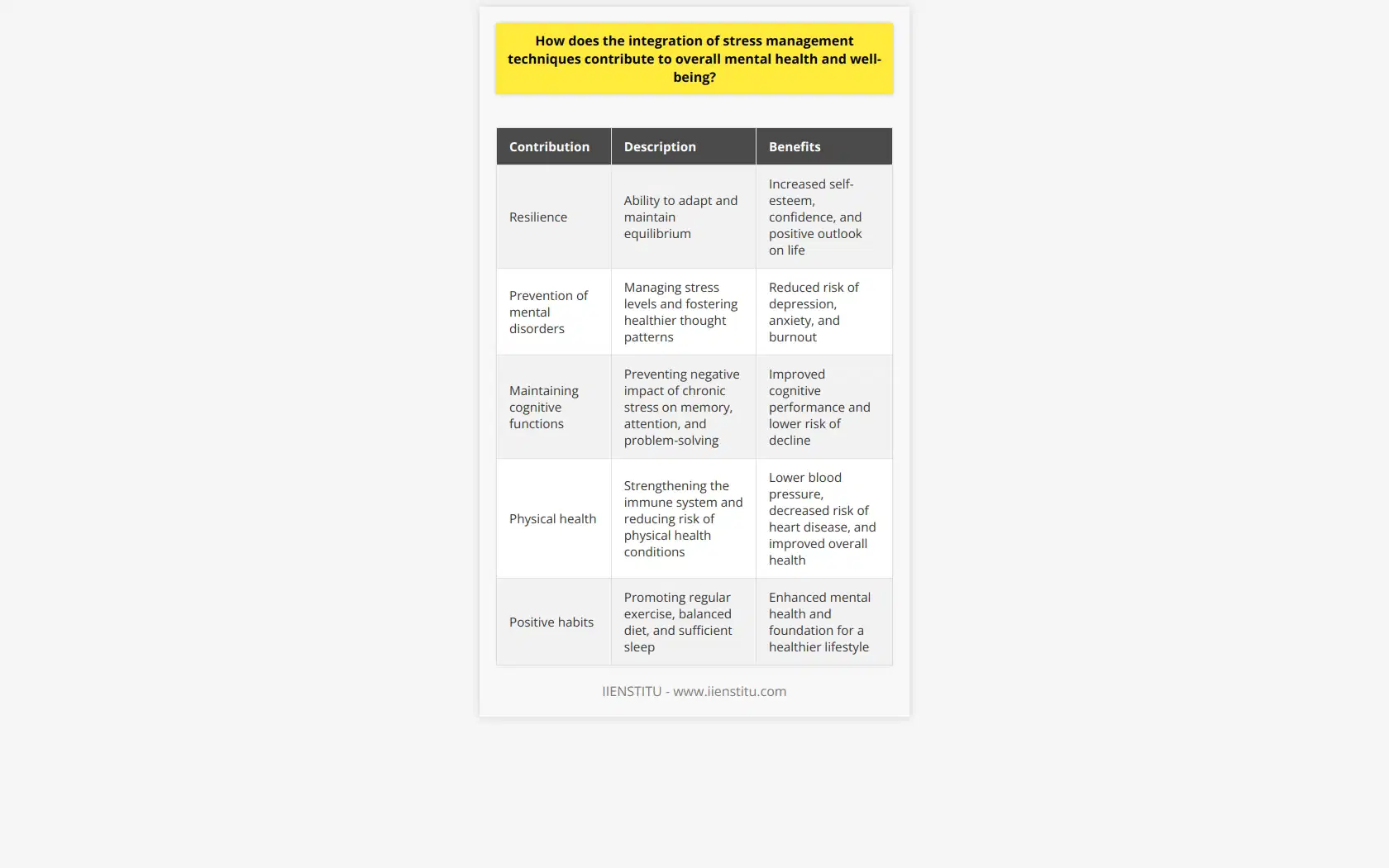
Are there any potential drawbacks or limitations to implementing stress management practices in a professional setting?
Drawbacks of Implementing Stress Management Practices
Limited Time for Implementation
One significant drawback to implementing stress management practices in a professional setting is a lack of time. Employees often have demanding work schedules, making it difficult to allocate sufficient time for proper stress management activities. Moreover, companies may not prioritize these practices due to more pressing concerns, resulting in limited support for employees who need it.
Individual Differences and Preferences
Another limitation lies in individual differences and preferences among employees. Specific stress management techniques may be more effective for some individuals than others, making it challenging for organizations to develop a one-size-fits-all approach. This variability may lead to a lack of engagement in company-wide stress management initiatives, potentially hindering the intended benefits of these practices.
Conflicting Priorities
Organizations might also experience conflicting priorities when implementing stress management practices. For instance, managers may need to balance budgetary concerns, productivity goals, and employee well-being to create a successful work environment. This balancing act could result in the underfunding or dismissal of stress management practices in favor of focusing on more measurable and short-term business outcomes.
Stigmatization
Unfortunately, the workplace stigmatization of employees seeking support for stress management can also serve as a barrier to effective implementation. Employees may hesitate to openly discuss their mental health and stress-related issues, fearing judgment or repercussions from their colleagues and supervisors. This reluctance could lead to a lack of awareness regarding the importance of stress management practices, ultimately limiting the prevalence and impact of such initiatives.
Inadequate Training of Managers
Lastly, the inadequate training of supervisors and managers to recognize and address stress-related issues among their employees can limit the effectiveness of stress management practices. Without proper training and support for management, employees might not receive the necessary guidance and resources to effectively manage their stress, leading to a cycle of uncertainty and potentially exacerbating workplace stress levels.
Conclusion
While stress management practices in professional settings hold the potential to improve employee well-being and productivity, several factors can pose a challenge to their successful implementation. By acknowledging and addressing these limitations, organizations can better support their employees' mental health, creating a more favorable work environment for all parties involved.
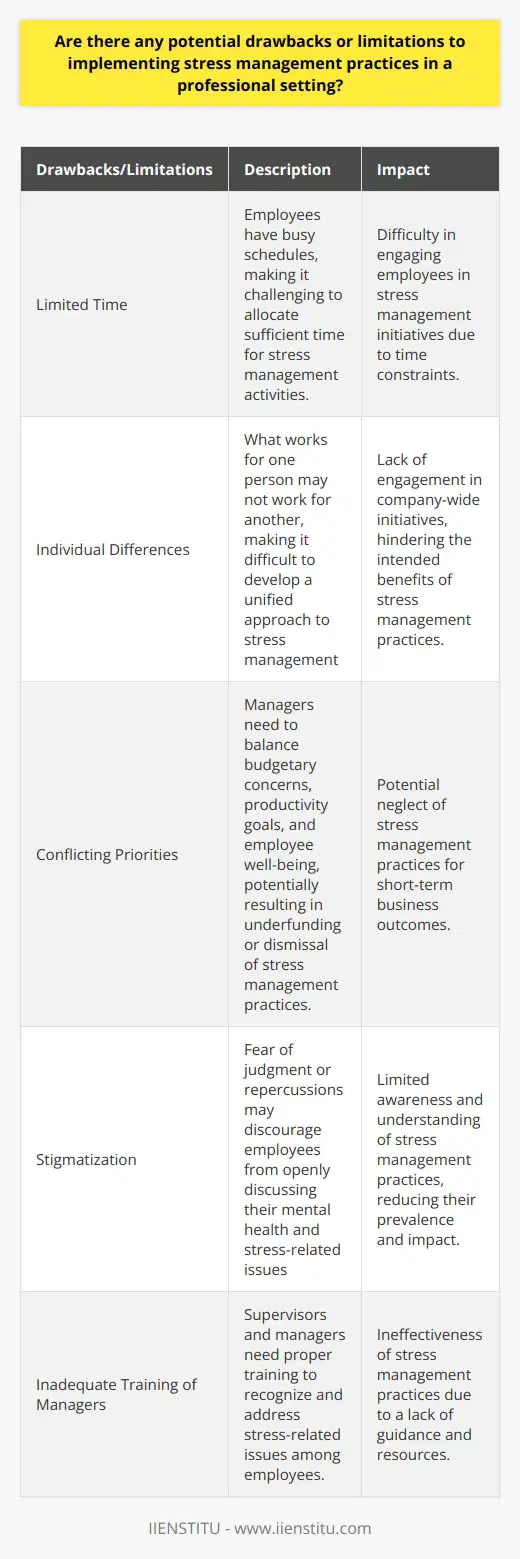
What are some benefits of stress management in an academic environment?
Stress Management Improves Academic Performance
Stress management can significantly enhance academic performance. Students who handle stress effectively can concentrate better on their studies. They can remain focused during their lessons and retain more information, leading to better understanding of the subject matter. As a result, they tend to score higher in exams and assignments.
Boosts Mental Health
Reducing stress levels can also protect the mental health of the students. Undue stress can lead to anxiety and depression. By managing stress, students can avoid these issues, improving their mental well-being. They can face challenging situations with greater resilience and a positive mindset, which is critical in an academic environment.
Improves Physical Health
Stress can also have harmful effects on the body like weakening the immune system and accelerating aging. By managing stress, students can maintain stronger immunity, reducing absence due to sickness. Moreover, they can also keep high energy levels, required to meet the demands of academic life.
Promotes Better Relationships
Stress management can help in building and maintaining healthy relationships. Stressed students often have strained relations with their folks, classmates, and teachers. By managing stress, they can have better interactions and cooperation, fostering a positive academic environment.
Heightens Productivity
Reduced stress results in enhanced productivity. Stress-free students are more enthusiastic and motivated to engage in academic activities. Better decision-making abilities and problem-solving skills are other benefits. All these contribute to higher academic productivity.
In conclusion, stress management in an academic environment nourishes the academic ability of students, safeguards their physical and mental health, improves their social relations, and boosts their academic productivity. Therefore, stress management strategies should be an integral part of the academic curriculum.
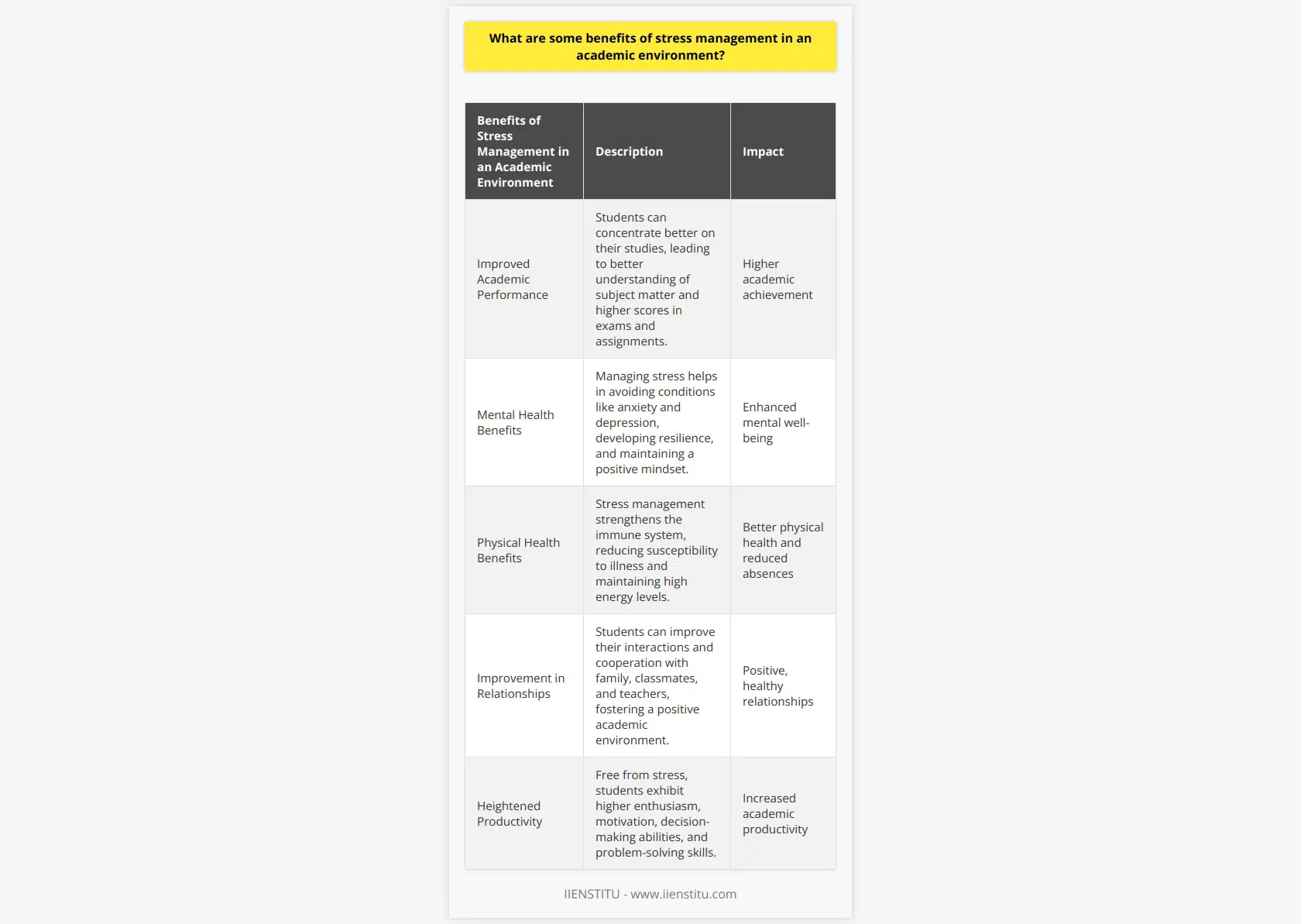
How can stress management strategies be integrated into daily routines for improved mental health and productivity?
Start with Self-awareness
An initial step to incorporating stress management strategies into daily routines involves fostering self-awareness. Identify stressors and observe how you react to them. Journaling can make this process more structured and insightful.
Adopt Healthy Habits
Lifestyle choices significantly influence stress levels. Regular exercise, a balanced diet, and adequate sleep can naturally boost resilience against stress. Intermittent breaks throughout the day can also prevent stress build-up and promote productivity.
Utilize Stress Reduction Techniques
Certain techniques directly target stress reduction. Methods such as deep breathing, meditation, and yoga have proven effective, and integrating them into your daily schedule can promote mental health and productivity.
Set Priorities
Setting realistic goals and priorities can prevent unnecessary stress. Focusing on tasks in order of their importance can facilitate organized work flow, thus reducing feelings of overwhelm.
Practice Mindfulness
Mindfulness helps ground oneself in the present, reducing stress and anxiety. Incorporating mindfulness in routine activities or setting aside a few minutes for focused mindfulness can be beneficial.
Maintain Social Connections
Quality interpersonal relationships serve as essential buffers against stress. Regular communication or activities with friends, family, or colleagues can help diffuse stress.
Seek Professional Help
Sometimes, despite implementing these strategies, stress may persist. Do not hesitate to seek professional help, as therapists and counselors have effective techniques to manage stress.
In conclusion, integrating stress management strategies into daily routines isn't a one-size-fits-all process. Tailoring techniques to suit individual preferences and routines can allow for seamless integration, improved mental health, and heightened productivity. Incorporating a holistic approach that targets physical health, mental state, and social connections ensures comprehensive stress management.
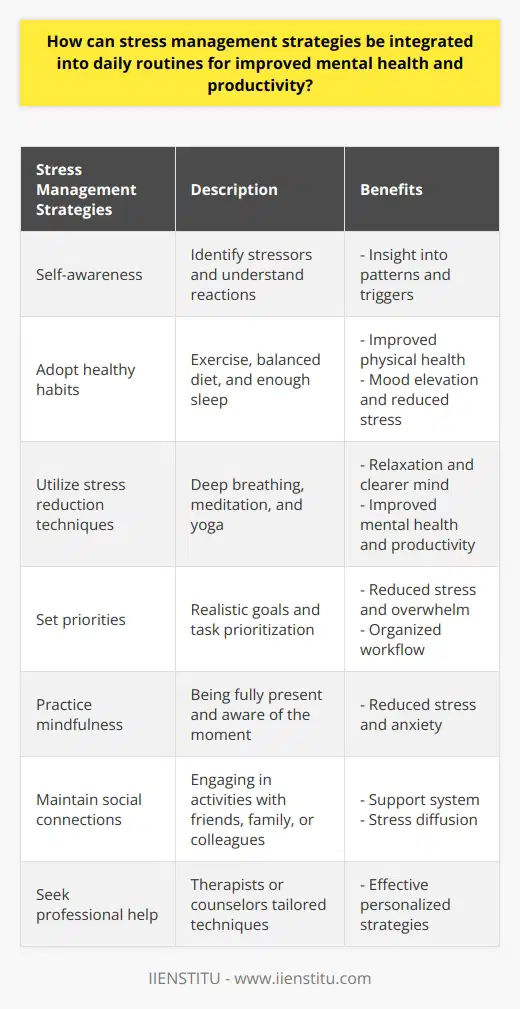
What are the long-term effects of incorporating stress management practices on personal and professional growth?
Incorporating stress management practices has long-term benefits on personal and professional growth.
Personal Growth Enhancement
Firstly, personal growth rises considerably with effective stress management. These practices such as mindfulness, meditation, and aerobic exercises improve mental health. They stimulate cognitive functioning and emotional stability. Over time, ability to make sound decisions improves, leading to better life choices. Additionally, practices like yoga, tai chi, and deep breathing exercises boost physical health by reducing heart disease risk and promoting overall well-being.
Boosting Professional Growth
In a professional context, stress management aids in productivity. It fosters mental clarity and focus, vital in tackling work related tasks efficiently. Increased resilience to demanding situations intensifies ability to meet deadlines without compromising on work quality. It further cultivates healthier work relationships. Reducing stress levels contributes to better communication and collaboration, key to a harmonious work environment.
Lifetime Benefits and Counter-effects
The benefits extend beyond immediate effects. Over a lifespan, continual use of stress management practices can yield troves of benefits. It can mitigate age-related cognitive decline, enhance vitality, and sustain a healthy life. Additionally, lower stress levels decrease the likelihood of developing chronic diseases such as hypertension, diabetes, and obesity.
However, It's important to note that individuals respond differently to stress. One must pick practices which cater to their individual stress response. For some, physical activities work best. For others, meditation might be the key. Ultimately, consistent stress management is the ticket to long-term personal and professional growth.
Despite numerous benefits, neglecting stress management can lead to burnout. This can both stagnate personal progression and lead to professional setbacks. Therefore, integrating stress-management practices in daily routines is vital in securing long-term growth trajectories.
